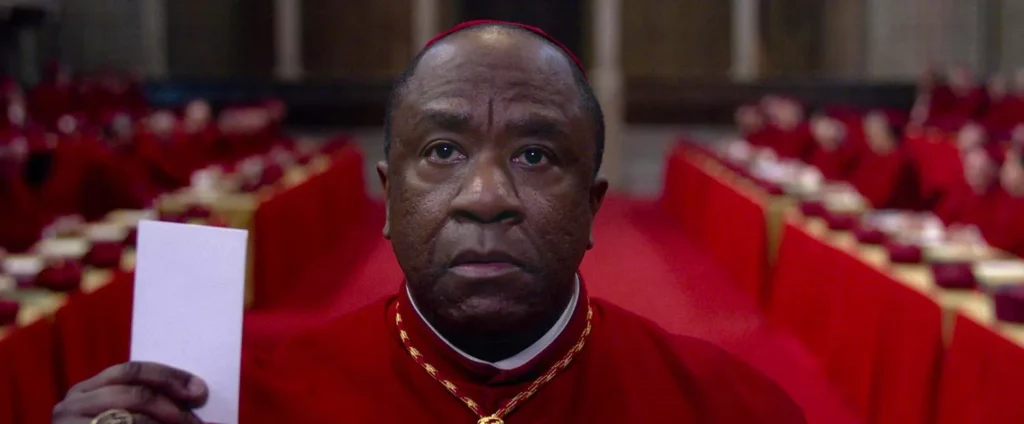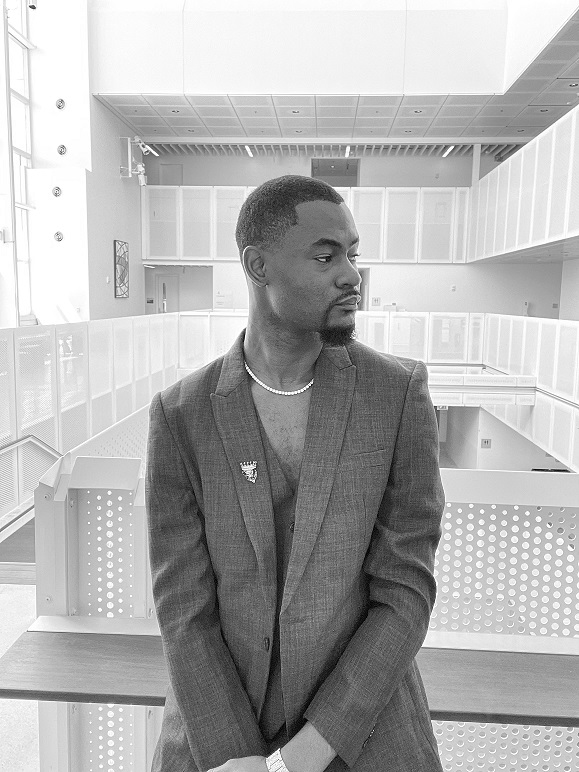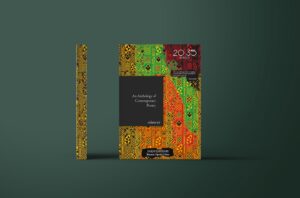When the cardinals begin voting in Conclave, Edward Berger’s aesthetically seductive depiction of a papal election, the result is astounding — a signal that, among recent ecclesiastical dramas that aspire to let us into the workings of one of the world’s most guarded groups, a list that includes Christoph Schrewe’s historical thriller The Conclave (2006), Nanni Morretti’s reverent Habemus Papam (2011), Paolo Sarrentino’s satirical series The Young Pope (2016), and Fernando Meirelles’s buddy biopic The Two Popes (2019), none has hankered as far into the political zeitgeist as Conclave is willing to. Few have taken literally one of the Vatican’s central secrets: how the princes of the church choose their king.
As the dean of the cardinals, Thomas Cardinal Lawrence, announces the tally, the camera cuts again and again to Joshua Cardinal Adeyemi, the Nigerian who has just been installed as the frontrunner. Cardinal Adeyemi is written with personal complexity, but it is the actor who plays him, the Tanzanian thespian Lucian Msamati, who shades him with his eyes, gives him a confidence that is recognizably African, and a body language and awareness that, in this gathering of mostly white men where some have sneered at him behind his back, he is definably black African, and therefore must, despite seeming to be opinionated, be reticent.
That initial formidable vote result capsizes the viewer’s early reading of motives, and, in the freedom of fiction, begins to feel like how these patrician prelates might actually think when shut inside the Sistine Chapel, away from the laity and media punditry, and tasked with choosing a new leader for the world’s one billion Catholics. It begins to feel as though, within those holy walls of a 2,000-year-old institution where some already launched an Italian nationalist campaign, these world-weary custodians know better than to place racial politics over individual capability.

But that scene is ahistorical, and, as the film disrobes for its polemic, lands as a whitewashing of history — a blackwashing that should trouble anyone observing the papacy from an African vantage. Peter Straughan’s screenplay, which has won a Golden Globe, a BAFTA, and will likely take the Oscar and help the film to a Best Picture win, is based on Robert Harris’ 2016 novel Conclave — both men are executive producers — and broadly follows its plot. It swaps the novel’s Italian central character, Jacopo Lomeli, with an American, Thomas Lawrence, to enable embodiment by the English actor Ralph Fiennes. But the film’s disturbing character switch is not in how it circumvents the phenotypic differences of Caucasian ethnicities; it is in how it transposes a distinct historical association, moving it from European Catholicism to African Catholicism, in the storyline of Cardinal Adeyemi.
This is because Cardinal Adeyemi’s status calls to mind the one African cardinal closest to the papacy and twice touted as a potential pope himself: Francis Cardinal Arinze, whom I profiled for Open Country Mag’s August 2024 cover story, just before learning about the existence of Berger’s film. Like Arinze, Adeyemi is Nigerian, but unlike Arinze, who is Igbo, Adeyemi is Yoruba. It is a change in ethnicity present in the novel, perhaps to insulate the film as a work of fiction, but a twist that only sheds light on the problem: there have been so few black African cardinals in the last few centuries since European colonialism, and even fewer linked to the papacy, that any fictionalization of them should bear more responsibility than that of a Western cardinal.
In fact, there have been only two conclaves in recent history where a black African was papabile. The first was in 2005. Cardinal Arinze, then Prefect of the Congregation for Divine Worship and the Discipline of the Sacraments and effectively the fourth-highest ranking official in the Vatican, seemed to be the frontrunner to replace his friend Pope John Paul II. Of the then 264 previous popes, only three have been traced as African — Victor I, Miltiades, and Gelasius I — and only the second perhaps was black. The conclave of 2005 stuck to its European dynasty and chose Josef Cardinal Ratzinger of Germany, who became Pope Benedict XVI, with Mario Cardinal Bergoglio of Argentina in second place. We now know, with all the details that have emerged in the 20 years since that gathering, that Ratzinger was always the favourite and that a more liberal clique backed Bergoglio primarily to stop him, but also because Bergoglio has Italian heritage, and Italians had held the papacy for four centuries until Poland’s Karol Cardinal Wojtyla ascended as John Paul II. Bergoglio himself voted Ratzinger. There has been no indication that Arinze, a media favourite, got more than a single vote.
That pattern repeated at the conclave of 2013, where Bergoglio was finally enthroned as Pope Francis I. This time, in addition to Arinze again, a second African cardinal was now in contention: the ultra-conservative Peter Cardinal Turkson of Ghana. That conclave leaned towards the Americas, and the most votes either African got was two for Turkson.
Conclave watchers know why: the College of Cardinals is dominated by Europeans and so votes European, and even though the Catholic Church has seen superior statistical growth in Africa, with 176 million faithful, only 29 of the 236 current cardinals are from the continent, and only 17 are electors, and, at present, there is no African heading a dicastery in the Roman Curia. The ratios were similar when Harris’ novel was published. The racial bias has not escaped the notice of African cardinals themselves. “They don’t think we are ready for high positions,” Archbishop Buti Tlhagale of Johannesburg said ahead of the conclave of 2005. “They fear paganism might come through the back door.”
It is a missed beat in Msamati’s otherwise memorable performance that his Cardinal Adeyemi is expectant. Msamati plays him like a man who secretly wants to be king, who is wary but does not disguise his wish. It is a naivete unbecoming of a black African prelate, a strange acting choice for a reaction that only two men in recent history could have even imagined. It does not ring true for anyone who has ever watched or read the responses by African cardinals to being pope. Cardinal Arinze himself put it best during our conversation: “Look, a cardinal would have been presumed to have something wrong with him if, going into the conclave, he believed that he would be elected. And if he was not elected and he was disappointed, then he would not be normal. That would actually be good proof that he should not be elected. No cardinal who is normal would expect to be elected or not be happy when a very capable cardinal is.” Msamati’s Cardinal Adeyemi’s forsaking of lived-in insight is why he does not realize that he is on a cliff. It presages the steep fall in Conclave’s seemingly progressive commentary on race.
It begins with another black African: Sister Shanumi Iwaro, a Nigerian nun serving the cardinals during lunch, who, encountering Cardinal Adeyemi, drops her tray in shock and flees the hall. The cardinal rises in fury, realizing the sabotage at work, and storms out. Sister Shanumi, played by the Nigerien actress Balkissa Maiga, knows the cardinal from their illicit relationship years ago, which produced a child that she gave up for adoption. When Fiennes’ Cardinal Lawrence, having extracted the story in confession, visits Cardinal Adeyemi in his room, he makes it clear that Adeyemi’s candidacy is over. The church cannot afford a scandal.
One by one, the other candidates drop, their scandals ranging from corruption to that sabotage itself. The film’s polemic: this is a crisis-ridden institution with many sins in many places, sins hidable for the greater good, and hope for light is slim. Yet all sins are not equal, and of the now hopeless, none is so provoking of the viewer’s disappointment and resentment as Adeyemi taking advantage of a young woman when he was a young priest in Nigeria. Sexual abuse is widespread in the Catholic Church, with thousands of cases involving minors investigated in the United States, Europe, and Australia. It has become, in the last few decades, the defining moral damage of Western Catholicism, yet the ahistorical vision of Conclave pins that responsibility not on a cardinal from any of those Western countries but on its sole black African papabile.
Fiction need not owe fidelity to history, but when it borrows freely and selectively shirks the responsibility and patterns of factuality, it is reaching so far as to rewrite it for an audience unaware of it, an audience surrendered to the power of cinema and swayed by its realism. At that point, it begins to constitute a moral damage. The scale staggers. The majority of people who will see and love this film will not be African, but they will come away with an impression of complicity, of the black African character who embodies some of their worst fears.
Conclave’s failure of imagination is only part of a larger, deeper, popular racial trope in Hollywood, where, irrespective of story logic or genre or even marketing, the rule of casualty is set in ink: the black characters mostly die first or die worst or die out. In the last few years, I have been most resentful of the graphic nature of Vaemond Velaryon’s beheading in House of the Dragon, a prequel series that emphasized its sole black Great House, the Velaryons, due to criticism of the original Game of Thrones’ relegation of its black characters. (Vaemond dies because he makes an accusation about sex.) Some racialized worst-case killings, literal ones like Vaemond’s and metaphorical ones like Cardinal Adeyemi’s, pass undetected because the characters are not mere plot devices. The implications remain missable even as, in Harris and Straughan and Berger’s imagination, the black death trope overlaps with another, more obvious one: the black male as the avatar of inordinate lust and taker of female bodies.
In setting up the only black cardinal, the one representative of African Catholicism, as a beneficiary of the fictionalized post-racial mood of a Eurocentric Catholic Church, only to install him as the face of that institution’s factual sexual transgression, Conclave has elected a dangerously ahistorical polemic. It, illogically, kills the African worst. The insidious garb of “fiction” does not parry the damage. ♦
If you enoyed what you just read, please consider making a PayPal donation to enable us to publish more like it.
No One Covers African Literature and Nollywood Like Open Country Mag
— Chimamanda Ngozi Adichie Is in a Different Place Now
— How Mami Wata Swam to Sundance
— The Worldly Ways of Teju Cole
— Rita Dominic‘s Visions of Character
— How Leila Aboulela Reclaimed the Heroines of Sudan
— Maaza Mengiste‘s Chronicles of Ethiopia
— How Tsitsi Dangarembga, with Her Trilogy of Zimbabwe, Overcame
— “Our Literature Has Died Again”: Nigerian Writing in the Era of the Nomadists
— The Next Generation of African Literature
— The Methods of Damon Galgut
— The Epic, Transformative Comeback of Chidi Mokeme





4 Responses
“Fiction need not owe fidelity to history, but when it borrows freely and selectively shirks the responsibility and patterns of factuality, it is reaching so far as to rewrite it for an audience unaware of it, an audience surrendered to the power of cinema and swayed by its realism.”
I am THE audience unaware of history, surrendered to the power of cinema, and swayed by its realism, and I am super glad that I came across this essay. Nothing could have been more enlightening.
A reechoing of Elechi Amadi’s abiding argument that literature cannot be solely for literature sake. It embodies lessons, or must and in so doing cannot be totally ahistorical.
A sound African voice to The Conclave!
Dear Mr Otosirieze:
I agree completely with your assessment of “Conclave’s” treatment of Cardinal Adeyemi. Not only was Adeyemi’s sexual abuse of Sister Shanumi a Racist trope, but the worst kind of trope. 400 years of sexual abuse perpetrated by white men has led to the current crisis in the church, Sexual abuse in African Catholic dioceses would be 99% committed by white priests against young Black children.
What was even more offensive to me was the notion that Cardinal Adeyemi was not very smart. To accede to that level, he would have had his skeletons securely locked in the closet. It’s so sad that now at a time that we have an actual conclave, and the entire world is going to be focused on Africa, the movie misses the mark on African papabiles so completely. I would love to hear you interview Cardinal Arinze about this movie, maybe do a reaction video with him and post it online.